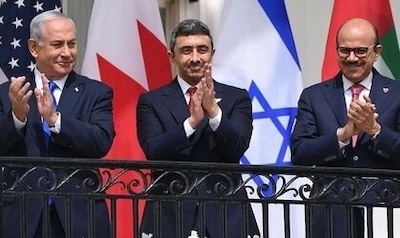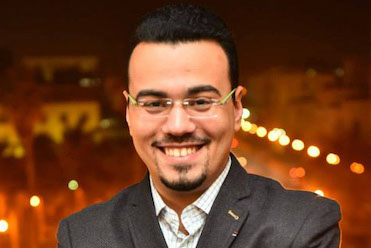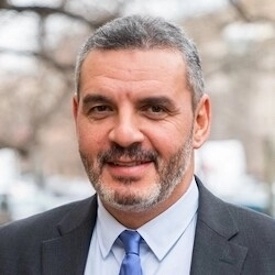The tripartite alliance destabilizing the Horn of Africa
The common political vision of the leaders of Ethiopia, Eritrea and Somalia threatens to throw the region into turmoil.

Eritrea’s President Isaias Afwerki, Ethiopia’s Prime Minister Abiy Ahmed, and Somalia’s President Mohamed Abdullahi pose during the inauguration of the Tibebe Ghion Specialized Hospital in Bahir Dar, northern Ethiopia on November 10, 2018 [File: AFP/ Eduardo Soteras]
Three years ago, a wave of political change swept across the Horn of Africa. In Sudan and Ethiopia, popular protests led to a change in leadership and what many assumed were democratic transitions. Ethiopia and Eritrea ended their two-decades-long rivalry, for which Ethiopia’s Prime Minister Abiy Ahmed was awarded the Nobel Peace Prize. The peoples of the Horn of Africa were euphoric for what many thought would be a new chapter in the region’s history.
Today, contrary to expectations, mass atrocities, inter-state wars, and autocratic entrenchment have become the defining features of the region. Over the last six months, several international conflicts have (re)emerged, notably between Ethiopia and Sudan, Eritrea and Ethiopia’s Tigray region, and Somalia and Kenya.
KEEP READING
No proof of Eritrean troops’ Tigray exit, crisis worsening: UNEritrean troops open fire in Tigray’s Adwa, kill 3: Rights groupTrauma, anger as Tigrayans recount Eritrea troops’ ‘grave crimes’Ethiopia’s Tigray conflict and the battle to control information
Egypt and Sudan are also threatening Ethiopia over the latter’s plans to proceed with a second filling of the controversial Grand Ethiopia Renaissance Dam on the Blue Nile river. Within Ethiopia alone, two significant insurgencies have been launched in this period, while ethnically motivated mass atrocities continue to take place regularly. The Horn of Africa is caught in a spiral of violence where domestic and regional conflicts overlap and fuel each other.
The conflicts and rights violations in recent months are not isolated incidents but part of a broader pattern of regional disorder, in which non-compliance with fundamental international legal norms is a central feature.
Four destabilising trends
The first indicator of creeping anarchy in the Horn of Africa today is the recent proliferation of territorial disputes and overall disregard for state boundaries. Eritrea, for example, has begun occupying parts of Tigray in northern Ethiopia and is issuing Eritrean ID cards to residents. Ethiopia is making territorial claims on Sudan’s Fashaga region and in response, Sudanese officials are raising claims on parts of Benishangul Gumuz in Ethiopia.
Within Ethiopia, Abiy has supported the Amhara Regional State’s annexation of parts of Tigray Regional State. Sensing Ethiopia’s weakness, Djibouti recently announced its intention to exploit the Awash river in Ethiopia. At the same time, Ethiopian politicians are publicly making irredentist claims on Eritrean territory. Finally, Somalia and Kenya have exchanged threats over contested maritime space.
While there is nothing wrong with territorial demands made through legal means, what we see is a recent trend of states trying to take over territory by force in order to create a fait accompli. This has led to a contagion effect where one actor’s breach of the norm of territorial integrity encourages other actors to do the same.
The second trend is the increased prominence of foreign troops and mercenaries in domestic and regional conflicts. Abiy Ahmed has outsourced counterinsurgency to Eritrean soldiers in his war against Tigray as well as employed them in the border conflict with Sudan. Somali President Mohamed Abdullahi has also used Ethiopian troops against local opponents in Somalia. At the same time, Somali soldiers have allegedly fought in Ethiopia.
The main problems with these forces are their legal ambiguity, their tendency to commit extreme human rights abuses, and their unique capacity for fuelling inter-communal tensions. Eritrea’s President Isaias Afwerki is a central driver of this trend. He has built an entire economy centred on seeking economic rents from mercenaries and military bases.
The third problem is the growing disregard for international humanitarian law. Over the last six months alone, Ethiopian and Eritrean forces have engaged in systemic ethnically cleansing, rape, starvation, and massacres on an unprecedented scale. Eritrean troops have also destroyed refugee camps in Ethiopia hosting Eritrean refugees and forcibly returned thousands of them back to Eritrea. So far, this has not had any serious repercussions for the culprits, and when faced with criticism, Abiy and Afwerki have been dismissive.
Finally, today the Horn of Africa is also characterised by a sharp decline in multilateral diplomacy. The regional body Intergovernmental Agency for Development has been excluded from most of the conflicts and peace processes; it has notably been absent in the Ethiopia-Eritrea peace process and the war in Tigray. Instead, leaders have chosen to structure their cooperation and manage conflicts outside of institutional frameworks and through personal channels, which is a significant obstacle for preventive diplomacy.
The domestic politics fuelling regional instability
The destabilisation of the Horn of Africa is primarily a function of the domestic politics of Ethiopia, Eritrea, and Somalia. Abiy, Afwerki, and Abdullahi forged the tripartite alliance in 2018 with the aim of moulding the regional order according to their domestic political ideals. The three leaders are opposed to federalism, the accommodation of ethnonational diversity, and institutionalised governance. Instead, they prefer a centralised state under the command of a strongman who rules by fiat.
Afwerki – the godfather of the alliance – has ruled Eritrea without a constitution or a single election for almost 30 years. The source of his autocratic longevity is a universal and indefinite military conscription policy that has contained most of the youth in military barracks and compelled hundreds of thousands to migrate. These conditions have made popular rebellion practically impossible.
In Ethiopia, Abiy was selected by his political party to transition the country to democracy in 2018. However, using COVID-19 as a pretext in June 2020, he postponed elections and imprisoned his opponents. His attempt to concentrate power and suppress Ethiopia’s various ethnonational groups has led to civil war and looming famine.
Abdullahi was supposed to prepare Somalia for its first direct elections in several decades. Instead, he has been trying to centralise power in the federal government, which has resulted in conflict with various regional governments, notably Jubbaland. His term expired in February, and following the example of his regional allies, he extended it for two more years. This has initiated a constitutional crisis and armed conflict, which eventually forced Somali lawmakers to cancel his term extension. He is the first president since the Somali state-building process began in 2004 to try to remain in office after his term expired.
The regional trends that are today destabilising the Horn of Africa emanate from these domestic conditions. The efforts to break federalist forces in Somalia and Ethiopia have led to a spill-over of conflicts across state borders and have fuelled regional rivalries. The members of the tripartite alliance also manage inter-state relations in the same way they govern their domestic politics – they conduct diplomacy through personal channels and resolve disputes through military means.
The alliance’s behaviour is particularly destructive because of its long-term consequences. For example, territorial conflicts, ethnic cleansing, and rape as a weapon of war sow the seeds for inter-generational grievances. In Ethiopia, Abiy’s policies have already revived secessionist sentiments in Tigray and Oromia. And the extent to which Ethiopia will continue to exist as one nation after the war is now questionable. In the last six months alone, these conflicts have displaced more than two million people in Tigray, and the European Union’s envoy to Ethiopia says this may be “the beginning of one more potentially big refugee crisis in the world”.
What is unfolding in the Horn of Africa is a significant threat to international security. Halting the ongoing descent into anarchy requires, first of all, concerted efforts to compel leaders to respect their constitutions.
In both Ethiopia and Somalia, Abiy and Abdullahi must be pressured to enter into a political dialogue with their contenders to reset their democratic reform processes. Secondly, the use of foreign mercenaries in domestic conflicts must be deterred. In particular, verification mechanisms must be established to ensure the withdrawal of Eritrean troops from conflicts across the region. And finally, perpetrators of serious violations of international humanitarian law must be held accountable in order to pave the way for a reconciliation process but also to deter others from engaging in such acts.
Arab States Are ‘Washing Their Hands’ of Palestinians
By Andrew Harrod

Israeli PM Benjamin Netanyahu, UAE FM Abdullah bin Zayed Al-Nahyan and Bahrain FM Abdullatif al-Zayani at the signing of the Abraham Accords, Sept. 15, 2020.
In what proved to be a snapshot of professional views of the Arab-Israeli conflict on the eve of war, Georgetown University adjunct professor and Middle East Institute (MEI) senior fellow Khaled Elgindy concluded that the “Arab world is sort of washing [its] hands” of the Palestinian cause during a May 3 MEI webinar. He agreed with his fellow panelists addressing “Arab-Israeli Normalization: A Viable Avenue Towards Peace?” that America and Arab states are prioritizing practical self-interests over an increasingly failed, violent Palestinian state project.
The panelists examined the implications of Bahrain, Morocco, Sudan and the United Arab Emirates establishing normal diplomatic relations with Israel during former President Donald Trump’s final months in office. These agreements initiated by Bahrain and UAE’s Abraham Accords have become only more remarkable in the days following the panel. The Iranian-supported Hamas terror group in Gaza renewed rocket attacks against Israel on May 10, firing thousands of rockets at Tel Aviv and other Israeli civilian population centers. Israel retaliated with airstrikes and artillery. UAE officials warned Hamas of sanctions if its campaign persists.
These Arab state recognitions of Israel “robbed the Palestinians of one of the very few points of leverage that they had vis-à-vis Israel,” noted Elgindy. Palestinians suffer “already pretty stark power asymmetry” with Israel. Given this “existential threat to the Palestinian national project,” he added, the “Palestinian response across the political spectrum was extremely negative.”
Richardson Center for Global Engagement vice president and executive director Mickey Bergman, Elgindy’s fellow Georgetown adjunct, argued that these Arab states had been “very opportunistic” in making deals with Israel. The panelists noted that Trump recognized Morocco’s claim to the disputed Western Sahara and delisted Sudan as a state sponsor of terror. Meanwhile, Bahrain and the UAE wanted closer ties with Israel and the United States, particularly given growing Iranian threats.

|
Mohammed Soliman: For the Arab Gulf states, “geopolitics is back.” |
Focusing on the Gulf states, MEI nonresident scholar Mohammed Soliman noted that for them, “geopolitics is back.” Since Trump’s 2016 election, “America has less local capital and willingness to invest in a lot of problems around the world.” In particular, “America is leaving everything behind for the Indo-Pacific,” he noted.
“In order to reorganize the region in a post-U.S. dominated architecture,” analyzed Soliman, Gulf states “need to solve certain problems and realign with certain forces.” This precluded trying to resolve the interminable Israeli-Palestinian conflict with the moribund solution of creating a Palestinian state alongside Israel. “The current status quo cannot be sustained,” he explained, “based on a dream of having two-state solution soon.” As Elgindy concurred, “basically, what Arab states are saying is, we cannot simply wait around forever, either to pursue our bilateral interests or to pursue other geopolitical interests,” on “this unicorn called a two-state solution.”
By contrast, Gulf states seemed more interested in military alliances among themselves and with Israel to counter threats like Iran, said Soliman. “The idea of an Arab-Israeli NATO” goes back to President George W. Bush, and “we are getting there. It’s not a fancy idea anymore; however, it is going to take time.” Webinar moderator Joyce Karam, Washington correspondent for The National, noted that an “Arab NATO” was an “idea that was first started with Harry Truman” with initiatives that led to the failed 1955 Baghdad Pact.

Khaled Elgindy lamented that “the Arab world is sort of washing [its] hands” of the Palestinian cause.
Elgindy additionally cited the practical realities that facilitated Israel’s relations with Bahrain, Morocco, Sudan and the UAE. Unlike Egypt and Jordan, which made peace agreements with Israel in 1979 and 1994, respectively, this Arab quartet had never engaged in military hostilities with Israel. Correspondingly, several of these states have had “under-the-table relations with the Israelis anyway” and now merely “are consecrating an existing geopolitical order.”
Meanwhile, Arab states “will continue to pay lip service to two states because everyone needs some place to hang their hat” concerning a strategy for the Palestinians, observed Elgindy. Yet international actors are increasingly practicing “conflict management” and “risk aversion” towards the Palestinians, United States Institute of Peace Israeli-Palestinian Conflict Program, explained director Lucy Kurtzer-Ellenbogen. In tandem, she added, Israeli “trends are clear that the body politic has moved very much and largely to the right,” to the detriment of concessions to the Palestinians. This trend has only accelerated with the latest eruption of violence.
Yet even before Hamas’s latest jihad, Elgindy correctly faulted Palestinians for their plight, as the Palestinian Authority’s recent cancellation of long overdue elections—the first since 2006—further exposed the corruption of the P.A. dictatorship. The cancellation “is another sign of a, I don’t any other way to put it, but a bankrupt leadership, that has no strategic vision, that is incapable of even minimally doing what is required to put its own house in order.” “You can never really underestimate the Palestinian leadership’s dysfunction,” he added.
The election fiasco “is very much a self-inflicted wound,” said Elgindy, and Palestinians have “become their own worst enemies” by showing themselves unworthy of serious international consideration. This societal incompetence “is self-reinforcing” against Palestinian state aspirations, as Arab nations are “not inclined to want to move ahead with two states.” In this context, he chastised Israel, the United States and other countries for “opposing Palestinian reconciliation efforts” between the P.A. and Hamas, as if giving power to jihadist terrorists could solve anything.
The situational analysis of the Palestinian cause left Elgindy in a gloomy mood. Israelis continue to settle disputed West Bank territories, the historic Jewish heartland of Judea and Samaria, thereby continually limiting the extent of any future Palestinian sovereignty. “De facto annexation is happening on the ground as we speak, with nary a word of opposition” globally, he said; the situation “is deteriorating really, really rapidly.”
Yet what for Elgindy is Palestinian defeat is for others an Israeli victory over a hitherto implacable foe that has resorted to futile bloodshed yet again. After decades of Israeli resilience against Arab efforts to destroy the Jewish state, practical Arab governments are seeking mutually beneficial relations with Israel and abandoning extremist, rejectionist Palestinians. If this acceptance of reality spreads to other Arab states, perhaps one day even Middle East studies professors will follow suit.
Andrew E. Harrod is a Campus Watch Fellow, freelance researcher, and writer who holds a Ph.D. from the Fletcher School of Law and Diplomacy at Tufts University and a J.D. from George Washington University Law School. He is a fellow with the Lawfare Project. Follow him on Twitter at @AEHarrod.
